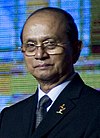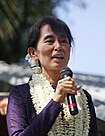Myanmar by-elections, 2012
|
|
|||||||||||||||||||||||||||||||||||||
|---|---|---|---|---|---|---|---|---|---|---|---|---|---|---|---|---|---|---|---|---|---|---|---|---|---|---|---|---|---|---|---|---|---|---|---|---|---|
|
|||||||||||||||||||||||||||||||||||||
|
40 (of the 440) seats to the Pyithu Hluttaw (House of Representatives) 6 (of the 224) seats to the Amyotha Hluttaw (House of Nationalities) 2 seats to Regional Parliaments |
|||||||||||||||||||||||||||||||||||||
|
|||||||||||||||||||||||||||||||||||||
The 2012 Myanmar by-elections were held on 1 April 2012. The elections were held to fill 48 vacant parliamentary seats. Three of those remained vacant as polling in three Kachin constituencies was postponed. There was no plan to fill the additional 5 seats cancelled in the 2010 election and 1 seat after a deceased RNDP member.
The main opposition party National League for Democracy was re-registered for the by-elections on 13 December 2011 as part of the reforms in Burma since 2010. It won in 43 of the 44 seats they contested (out of 45 available). Its leader Aung San Suu Kyi ran in the seat of Kawhmu, which she gained.
In February 2012, President Thein Sein remarked that the government would "seriously consider" allowing Southeast Asian observers from the Association of South East Asian Nations to observe the election. The Burmese government confirmed that it had requested for ASEAN election observers to arrive on 28 March, five days before the election. Canada, United States, European Union, China, and North Korea, as well as ASEAN dialogue partners (India, Japan, New Zealand, South Korea, Russia and Australia), were also invited to observe the election, although it remained unclear the degree of access these international observers would have. The United States sent two election observers and three journalists.
On 13 March 2012, the Union Election Commission, approved political party monitors to monitor polling stations during the election. In the previous election, only Union Solidarity and Development Party monitors had been allowed to observe the elections and ballot counts. A civilian-led monitoring group, including members of the 88 Generation Students Group, will also be scrutinising election irregularities.
...
Wikipedia



